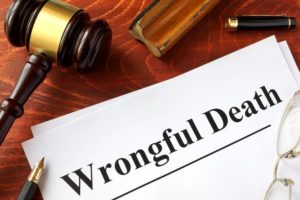The Ins and Outs of Nevada Wrongful Death Cases

Without getting too profound, the worst case for any scenario is death. In a broad sense, a proverbial “line in the sand” is crossed once an individual loses their life, and there is no way to undo the situation or recross that line. This concept holds true in the field of personal injury– injuries, even life-threatening ones, can be argued and debated, but death is absolute. So, wrongful death claims are usually some of the most substantial cases we see in terms of damages and outcomes.
Now, most people will associate death with criminal proceedings, murder charges, prison sentences, etc. While this is obviously the chief method for adjudicating cases involving death, it is certainly not the only option. A wrongful death claim is a civil action, meaning that the punishment in question is a monetary settlement, not a conviction. Of course, no amount of money could ever replace someone you love, but we’ve found over the years that a successful wrongful death claim can bring surviving family members much-needed closure as well as compensation, especially if criminal charges were unavailable or unsuccessful.
For a free legal consultation, call (725) 900-9000
Wrongful death claims will vary based on accident parameters as well as the state the case is filed in. In order to ensure that: 1) the proper evidence is preserved, 2) your case is within compliance, and 3) you get the highest possible settlement, all wrongful death claimants should retain a trusted personal injury attorney. Van Law Firm is the premier personal injury firm both in Nevada and nationwide– here’s some more info on Nevada cases specifically.
Wrongful Death Criteria in Nevada
Regardless of the accident itself, all wrongful death claimants must meet the following criteria (or elements) in order to be considered:
- There was an actual, confirmed death involved
- The death in question was directly caused by the negligent or otherwise irresponsible behavior of another (defendant)
- The person bringing forth the claim (plaintiff) must be an heir or confirmed representative for the deceased
- The plaintiff (and other loved ones) suffered damages as a result of the death in question, both financial and/or psychological
Confirmed Death
This may seem obvious, but you’d be surprised–medical records or a death certificate must be presented in order to confirm the death in question.
Death Caused by Defendant’s Negligence
This is often the most debated part of wrongful death claims, as it implies liability. An individual can kill another through negligent, reckless, or intentional behavior (again, the intent is more focused towards criminal cases– wrongful death claimants only need to prove negligence, not intent).
This can manifest in many different scenarios, including but not limited to:
- Auto accidents
- Unsafe or hazardous working conditions
- Medical error or malpractice
- The use of dangerous or defective products, drugs, or devices
Plaintiff is a Representative of the Estate of the Deceased
Click to contact our personal injury lawyers today
Obviously, a deceased person cannot bring forth a claim on their own behalf. Therefore, someone else with relation to the deceased must be put in place in order to file the claim. The common representatives tend to be the spouse or children of the individual in question, although if neither of these exists, the individual’s parents may come forward or other people who were reasonably dependent on the deceased including cousins, nieces/nephews, and stepchildren. Keep in mind, however, that the further away the representative is from the plaintiff (association-wise) the more difficult it will be to file the claim.
The Death in Question Caused the Representative (Plaintiff) to Incur Damages
Complete a Free Case Evaluation form now
This is the final element in wrongful death, and it calls into mind the aforementioned warning– the plaintiff must prove that he or she suffered financial and/or psychological damages as a result of the death in question. So, if the representative is very far from the deceased in terms of association, it will be difficult to argue that their death had a significant impact financially and emotionally.
Wrongful death damages will come in the form of either compensatory or punitive damages. Compensatory damages are the general forms of compensation that most people are familiar with, including medical costs, lost wages, and property damages. However, wrongful death cases can also include special damages, such as:
- Funeral and burial costs
- The medical bills and lost wages of the deceased
- Loss of companionship and support for spouses and children
- Loss of benefits/ inheritance
Punitive damages are rarer and only levied if the court is especially displeased with the plaintiff’s behavior and wishes to dissuade others from attempting the same. They are high fines that are separate from standard compensation–they are only awarded in about 5 percent of cases, however a good number of those involve wrongful death, as that is the ultimate indicator of unacceptable behavior.
Connect With Nevada Wrongful Death Attorneys
If someone you love was killed in an accident that was the fault of another, make sure to obtain the proper records and to appoint a representative for the deceased. Then call Van Law Firm to speak with the best and most experienced wrongful death attorneys in Nevada. We’ve helped countless families get the compensation they need for their loved one’s death, and although their loved ones can’t be brought back, the least we can do is make sure that the defendants do not go unpunished. Call (725) 900-9000 for more information.
No obligation consultations are always free.
Let Us Help You! Call Now: (725) 900-9000